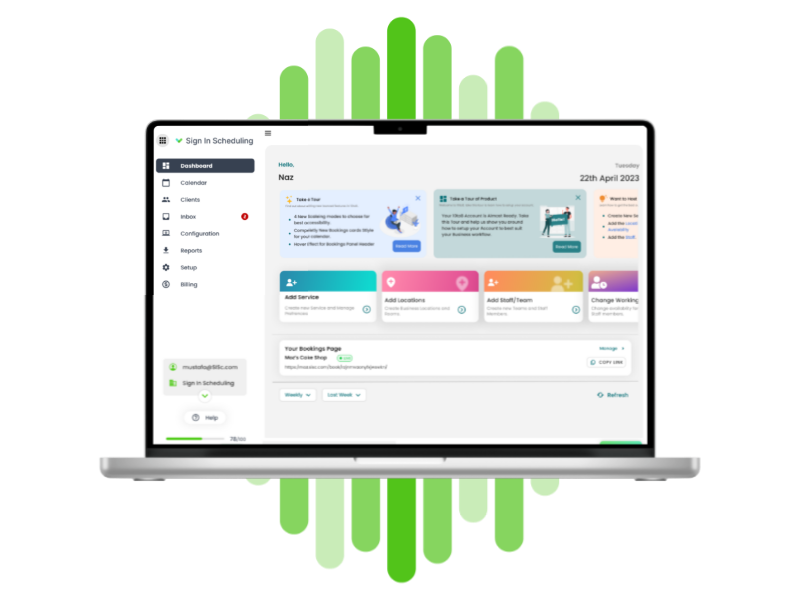As you’re trying to rebounce after lockdown and grow your business, you will require intelligent...
13 Unexpected Hacks for Starting an Online Business
What are some of the best ways of starting an online business? A question that many people ask themselves.
The internet and internet marketing is a huge field. There are so many different avenues into the business world and building an online business is a wonderful stepping stone to financial freedom. But how do you go from a brand new startup to a successful business?
If you are looking for the answer, then this blog post is for you! We will discuss all sorts of hacks so that you can put them into practice and start building your online empire. We’ll cover things like revenue streams, how to build an email list, and narrowing down your niche.
So without further ado; Here’s how to start a business online.
1. Narrow down your niche
Your niche is the group of people that you are trying to sell your product or service to. No business will appeal to absolutely everybody. And generally, the smaller the niche is, the easier it will be for you to convince your audience to buy from you.
Take travel and tourism businesses for example. Everybody loves to travel. In fact, it’s one of the largest industries in the world. So, if your business is about traveling, then your audience will be, well, everybody. And that might seem like a good thing – the more people the better, right?
Well, not necessarily.
Because you’ll also be competing with hundreds of other companies including well-established corporate giants like Lonely Planet, Trip Advisor, or KAYAK.
Instead, you’ll want to narrow down your niche. For example, let’s say that your business is about traveling around Europe. This is already a much smaller target audience and will be easier to focus on.
The same goes for van life travel or backpacking – all much smaller niches. You could even narrow things down even further and go for budget travel in Europe, or specifically travel in Cambridgeshire.
This way, you’ll be focusing on a much more targeted audience, and it makes it easier for you to convince people to buy from you.
So when you’re starting an online business, pick a niche, but make it specific. However, make sure not to niche it down too far, because there’s a chance you’ll end up with too small a following. The trick is finding the perfect balance.
2. Don’t disregard non-digital
Although we’re specifically talking about online businesses here, it’s important not to forget that there are plenty of non-online marketing strategies. It’s worth looking at how you can attract people to your business via offline means.
You can buy or rent some billboards, put flyers in cafes and restaurants, and distribute leaflets at public events. You could even try putting up a stand somewhere.
Offline advertising can be very effective and many online businesses still utilize offline marketing campaigns to get the word out there. It’s also a great way of testing your audience and business model.
If you’re starting from scratch, it might be better to go with print advertising instead of expensive methods like TV or radio. Many small businesses run successful adverts in local newspapers as they can reach thousands of customers – although it might cost several hundred pounds for just one advert.
But, there’s no need to limit yourself only to digital channels – don’t forget the offline stuff!
3. Keep the human element
Whether you run a B2B or a B2C business, you’ll ultimately be selling to humans. Even huge companies like Google or Amazon are ultimately run by people. So, it’s people you’ll need to appeal to.
This means you need to include a human element in everything you do online.
Customer experience is very important. Don’t be afraid to show your face, let people know you’re real. And don’t forget about writing in a conversational tone – it’s much more personal than using corporate-sounding language and confusing jargon. Also, try breaking the ice with small talk on social media platforms like Twitter or Facebook. People love interacting and having fun online so get them involved too by making some jokes and adding humor to your brand.
This helps build trust between you and potential customers because it shows that there are actual humans behind the digital mask. And that can make all the difference at crucial points when people need to choose one business among many other available options.
4. Don’t spread yourself thin across social channels
Every ‘how to start a business online guide’ will probably tell you to use social media. However, we’re here to tell you that you shouldn’t necessarily use all of the platforms. At least not right away.
![]()
A lot of effort goes into starting an online business and with writing blog articles and advertising and collaborating with other brands, trying to manage 5 or 6 different social media channels efficiently as well is going to end up being a lot of work.
So prioritize your focus and only use the social channels that bring you business.
For example, if Facebook is where most of your customers hang out, then spend all or at least a majority of your time there. Or maybe Instagram works best for you – it’s a visual platform so sharing photos and images could help build trust for your brand. This is a platform great for photographs or other artists.
But, don’t try to be everywhere at once. In the end, you’ll end up doing a much worse job than if you had simply picked one. Choose one to three main ones and really put in the effort to make them work for you.
Remember quality > quantity!
5. Learn about automation; Work smarter not harder
As you’re building an online business, it’s very important not to lose sight of the bigger picture. This means, while there will be a ton of work ahead of you, working hard all day long without breaks or taking time off for yourself isn’t good and can quickly lead to burnout.
So, start automating the more tedious tasks and freeing up your time to focus on building relationships with other businesses or planning for bigger projects.
This could include automating your appointment reminders, social posts, email sequences, or implementing a chatbot to manage incoming messages.
There are numerous software solutions out there that will help you out with this so it’s just a matter of doing research and testing them all until you find what works best for you. It might take some trial-and-error but once everything is set up correctly these tools will end up saving tons of time.
Automate those repetitive manual tasks now before things get even busier in the future.
6. Consider futuristic trends
Even if they look like they might not be necessary for a very long time, when you’re starting an online business, getting onboard with future trends and topics will also save you a lot of hassle in the long run.
For example, voice search is becoming increasingly popular. People don’t want to type on a screen anymore. They’d rather just speak out loud about what they’re looking for and have the answer playback for them instead.
You could also look into accepting payment via cryptocurrencies, using self-operating devices or apps such as Alexa and Google Home to manage your business, or even hiring virtual assistants that you can work with remotely.
7. Build relationships and collaborate early
One important aspect of growing a business is building personal connections within other businesses, especially ones that will complement yours.
Collaborating can be done in many different ways including co-marketing campaigns, cross-promotion, guest blogging on each other’s blog posts, creating joint webinars and courses. This way there will always be something new popping up all the time which is great if you don’t want things to go stale too quickly.

The best thing about this approach though is that by working closely together two businesses can grow much faster than one alone which means more revenue generated overall as well – win-win!
That said, make sure you only work with companies that align with your core values and mission otherwise it will be a bad fit from the start.
8. Build an email list early on
In addition to building relationships with other businesses, adding more value for free is another great way of attracting new customers when you’re building an online business.
This is something that can easily be done via a monthly newsletter, and this is definitely worth starting sooner than later. For this strategy to work most effectively though, you need to start building your email list right away.
The easiest way to do this is by having lead magnets on your blog that incentivize readers to subscribe for future updates. You could offer your readers a free eBook, checklist, or even a set of templates for them to download as an incentive – in fact, anything that your audience would consider helpful.
Ultimately, your email list is something you own. You might have tonnes of followers on social media, but if the platform goes down, changes its algorithms, or just stops being popular, then those numbers will mean nothing. Building an email list is like building an asset that no one can take away, it can increase your conversions and is well worth investing time into.
9. Don’t sit all your eggs in the same basket – have multiple revenue streams
Only focusing on one channel could mean that, if that channel was to dry up, you’re left with nothing. For example, if your business relies on ad revenue to generate an income if Google changes its algorithm and your traffic dramatically drops, you could end up with nothing. So you must diversify where possible.
Having multiple revenue streams also gives you more flexibility, and also allows you to experiment with new potential opportunities as they arise. For many companies, this might mean having one main product or service, ad revenue, an affiliate program, additional training courses, webinars, and more.
And sometimes these other programs can even give your business the necessary boost that it needs to become sustainable in the first place. So, if at all possible then always aim for diversification and see where things go – who knows what will happen next?
10. Don’t try to do everything yourself
One of the biggest mistakes new business owners make is not delegating tasks. People often think doing them themselves will be better or more cost-effective than paying someone else to help out.
Although you might need to take care of everything when you’re just starting out and are limited by budget, as soon as your business starts to grow, it will become more difficult to manage everything on your own.
This could then end up similar to our social media analogy where you spread yourself too thin and try to be in too many places at once. Excelling in a few places is always better than doing okay in all of them. So, if possible, try to find people who can help perform these tasks so that they are taken off your plate entirely.
You could research freelancers on Upwork or Fiverr. You can find all sorts of people there from social media managers to writers, to virtual assistants.
Just remember that delegating doesn’t mean abdicating responsibility.
Learning how to manage a remote team might be difficult at first, but it’s something you’ll pick up on over time. Make sure that you are always communicating effectively so everyone is clear about what needs to be done. This will ensure things stay running smoothly.
11. Be inclusive of your entire audience
Be inclusive and cater to all of your customers. All aspects of your business and website should be accessible to everyone, including people with disabilities.
Making your online business accessible could start with easy changes on your website: use alt-text for your images, allowing people to enlarge text, and having transcripts available for any videos you upload. You can find lists of do’s and don’ts for making your website more accessible online, but this is something worth looking into as soon as possible.
12. Start collecting data immediately
As soon as you start your business, start collecting data. The more information you have about the people who sign up for your emails or view your website the better.
This allows you to cater to the needs of your audience and shows you what they’re interested in, where they came from, what channels they use to find your site, or other actions that they take during their time with you.

In addition, customer insights will enable you to send out more relevant offers that are tailored specifically towards your clientele. While there might be additional costs involved when starting, these will pay themselves back many times over once things get going.
Here are some tools to get started with: Google Analytics to collect web visitor insights, Google Search Console to peek behind the curtain on relevant search terms, Facebook Pixel for tracking social media followers, Hotjar for website heat mapping.
13. Keep track of everything
Finally, keep an eye out for all opportunities and always be aware of what’s happening in your industry. This could mean joining certain groups or forums that allow you to interact with other business owners, reading industry blogs and newsletters, conducting social listening experiments, or just being open to new ideas from both your employees.
In general though, always keep in mind what others are doing so that you can come up with better ways of delivering value. Building an online business comes down to planning, taking advantage of opportunities when they arise, and staying flexible at all times.






Blog comments